Adverbs Teaching Resources
Save time on your adverbs lesson plans with printable worksheets, digital activities, adverb lists, grammar games and more from the teachers of Teach Starter.
This collection of teaching resources was teacher-created to help you help your students learn how to correctly identify and use this fundamental part of speech to show better how things happen in their writing. With editable curriculum-aligned resources, you can meet Australian curriculum standards while differentiating instruction for the individual students in your classroom.
New to teaching this part of the English curriculum or just looking for new ways to engage students as they learn about adverbs? Take a peek at this primer from our teacher team, including what an adverb is plus the different types.
What Is an Adverb? A Kid-Friendly Definition
Knowing the definition of this part of speech yourself is only part of the battle. You'll also need to explain adverbs to your students! So let's start with a kid-friendly definition.
An adverb is a word that describes how, when or where an action or verb takes place.
How
Many adverbs are used to modify verbs, describing how something is done or how an action takes place.
For example, the commonly used adverb 'quickly' describes how a person is running. Another example is 'loudly,' which describes how someone is speaking.

When
One of the crucial 5Ws — describing when something occurs — is crucial to setting a scene. Adverbs help writers do just that!
Examples of this include words like yesterday —describing when an action happened — and soon, describing when an action will happen.
Where
Adverbs can also describe where an action takes place. The adverb 'here,' for example, describes where someone is located. Other 'where' adverbs that students will encounter include 'there' and 'everywhere.'
Common Adverb Examples
The English language is stocked with some interesting adverbs that can help tell a colourful story, but some are more used than most. Here are some common examples of adverbs used in primary school writing:
- Very
- Often
- Always
- Never
- Well
- Hard
Types of Adverbs
There are six main types of adverbs that students are likely to encounter as young writers.
Positive Adverbs
These adverbs describe the manner or degree of an action without comparing it to anything else. For example, 'quickly,' 'loudly,' 'carefully,' and 'happily' are all positive adverbs. They don't require a point of comparison for the reader to understand what the writer is trying to convey.
Comparative Adverbs
Unlike positive adverbs, comparative adverbs require a comparison. In fact, these words are used specifically to compare the degree or manner of an action between two things or people.

For example, 'faster,' 'louder,' 'more carefully' and 'happier' are comparative adverbs.
Superlative Adverbs
Superlative adverbs compare the degree or manner of action between three or more things or people.
They are formed by adding '-est' to the end of the adverb or by using 'most' before the adverb.
'Fastest,' 'loudest,' 'most carefully' and 'happiest' are all superlative adverb examples.
Interrogative Adverbs
Adverbs that are used to ask questions are called interrogative adverbs. Some examples include 'when' and 'where.'
This type of adverb typically appears at the start of a sentence, and a comma often follows it.
Conjunctive adverbs
Adverbs that are used to connect independent clauses in a sentence are called conjunctive adverbs. These words function as a conjunction but are typically used to indicate a relationship between the two clauses, such as contrast, addition or cause and effect.
Words like 'however' and 'nevertheless' are conjunctive.
Relative Adverbs
Adverbs that are used to introduce adjective clauses —such as 'where,' 'when' and 'why' — are called relative adverbs. This type of adverb describes a characteristic of the noun or pronoun that the clause modifies.
- Plus Plan
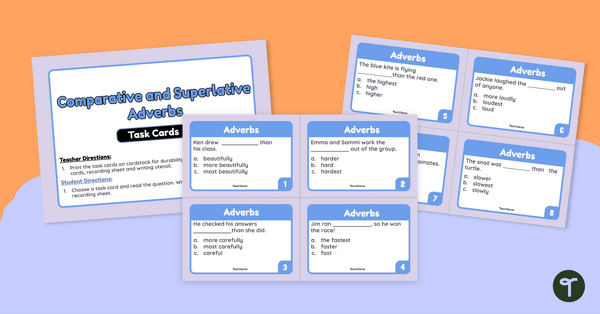
Comparative and Superlative Adverb Task Cards
Introduce these comparative and superlative adverbs task cards to your class to grow their understanding of these types of adverbs!
- Plus Plan
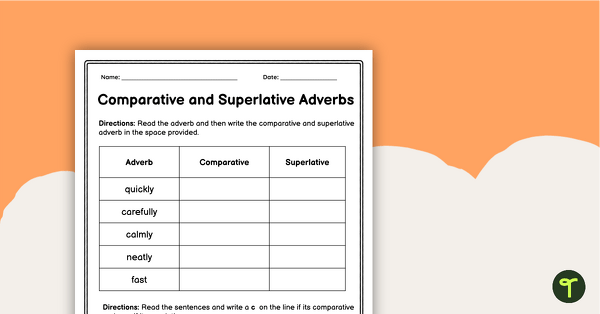
Comparative and Superlative Adverb Worksheet
Use this comparative and superlative adverbs worksheet to check students understanding of this grammar concept in your classroom
- Plus Plan
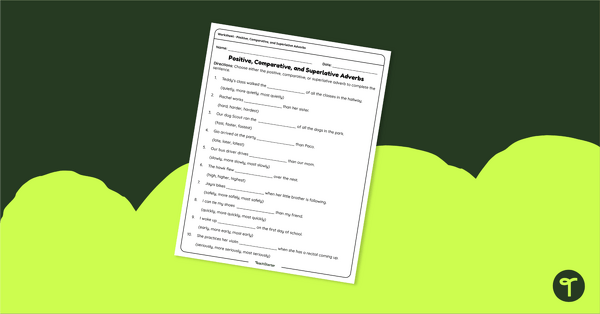
Positive, Comparative, Superlative Adverbs Worksheet
Give your students practise using positive, comparative, and superlative adverbs with an adverb worksheet.
- Plus Plan
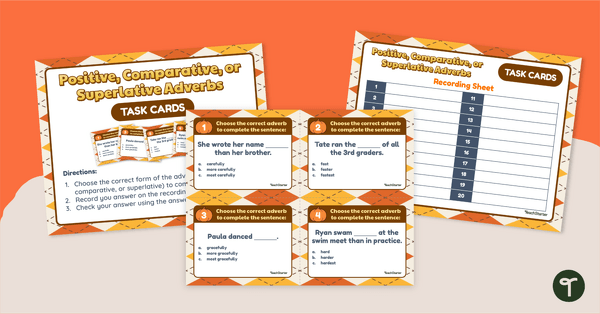
Positive, Comparative, and Superlative Adverbs Task Cards
Use these task cards to help students practise using positive, comparative, and superlative adverbs in sentences.
- Plus Plan
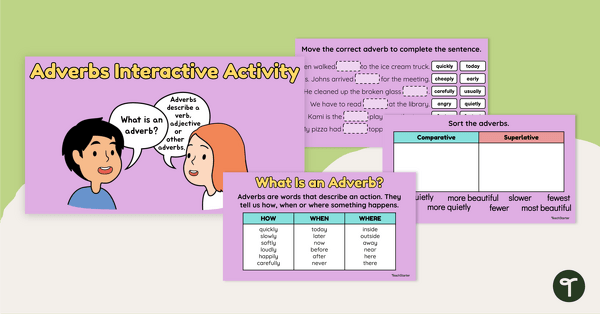
Adverbs Interactive Activity
Provide your students with engaging, interactive activities to help them improve their usage and identification of adverbs.
- Plus Plan
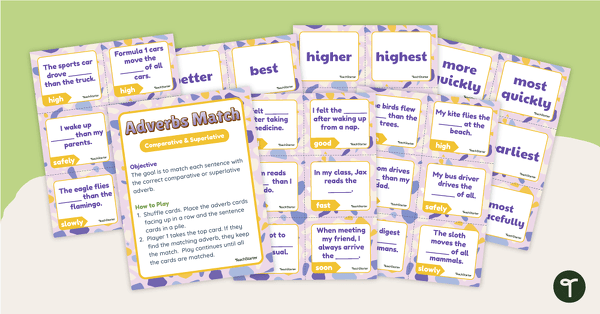
Comparative and Superlative Adverbs - Match-Up Activity
Practice using comparative and superlative adverbs with a matching activity.
- Plus Plan
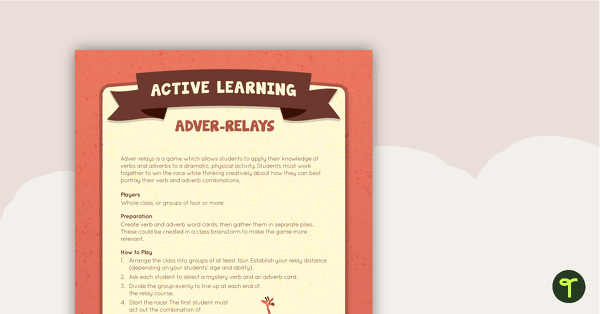
Adver-relays Active Learning Game
A whole class active game that encourages learning through a physical setting.
- Plus Plan
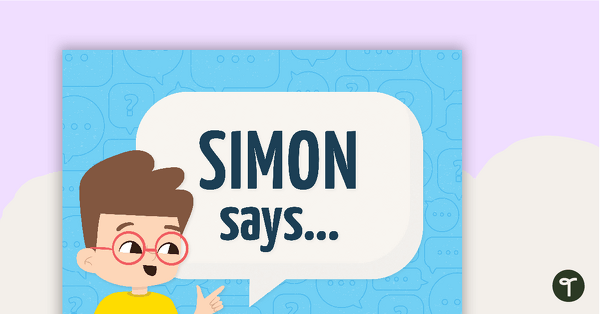
"Simon Says" Instruction Cards
A set of 24 instruction cards to use when playing "Simon Says".
- Plus Plan
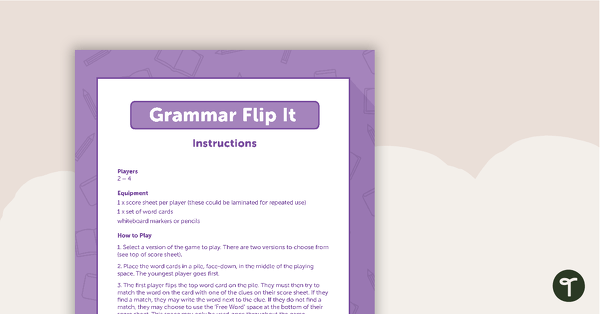
Adverb Grammar Card Game – Flip It!
A fun game for students to play in small groups to consolidate their understanding of adverbs.